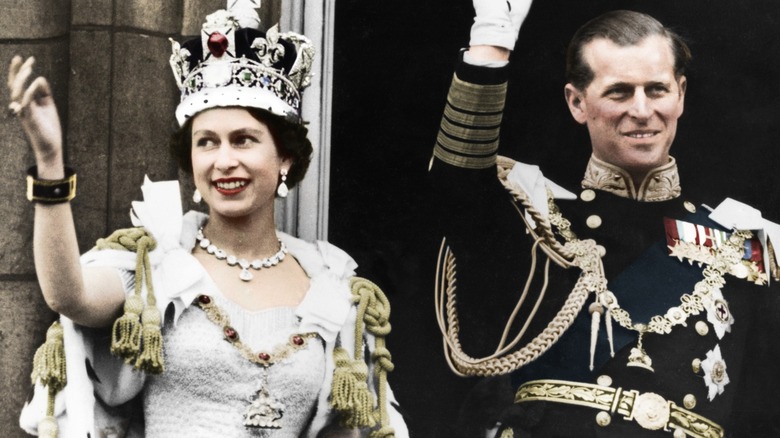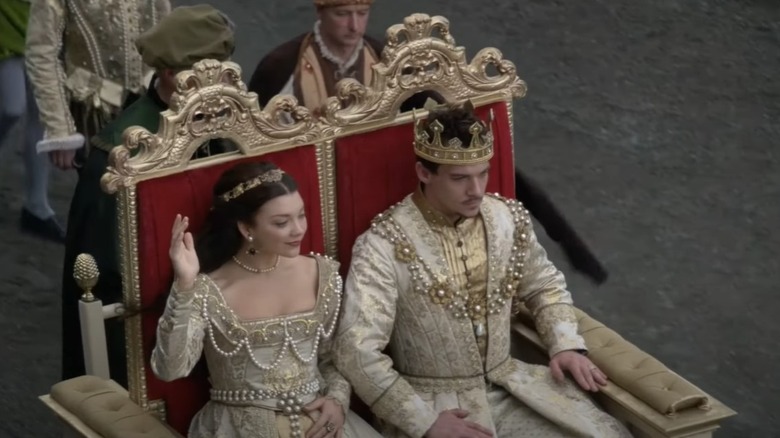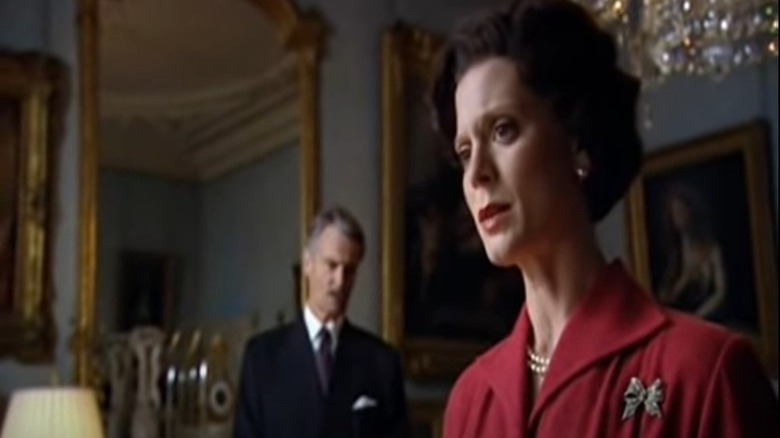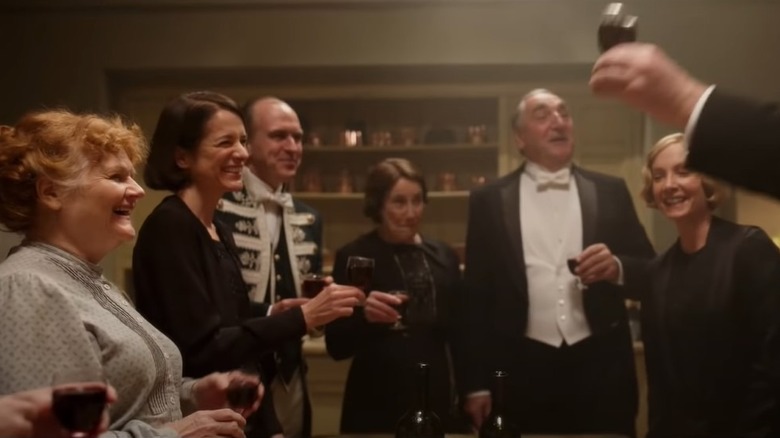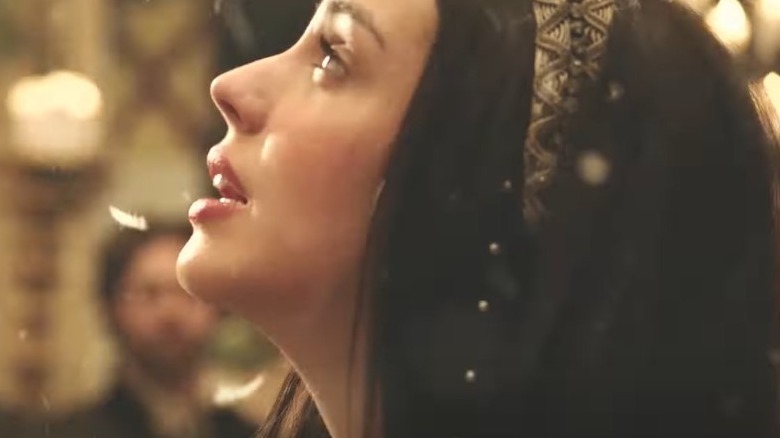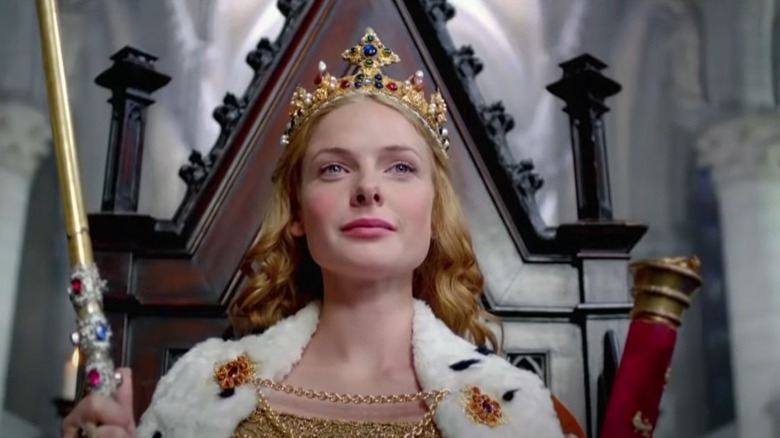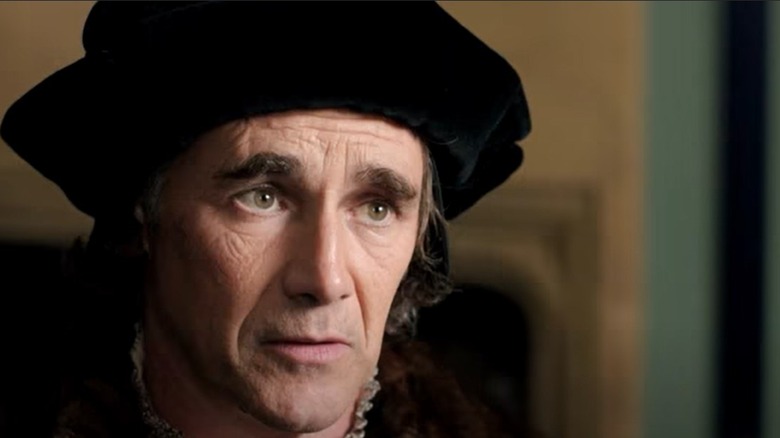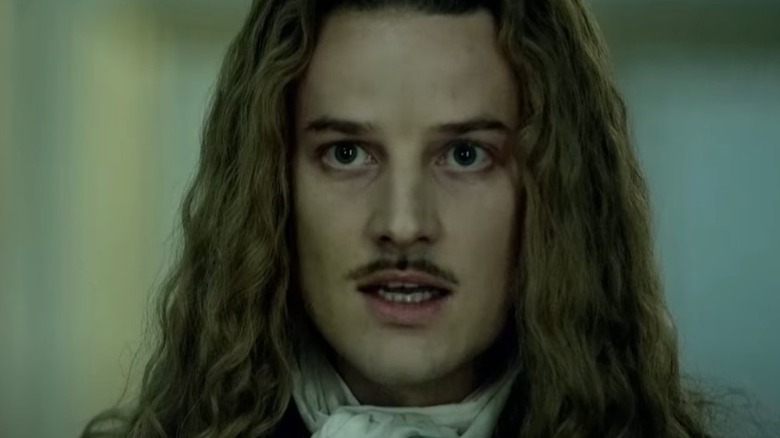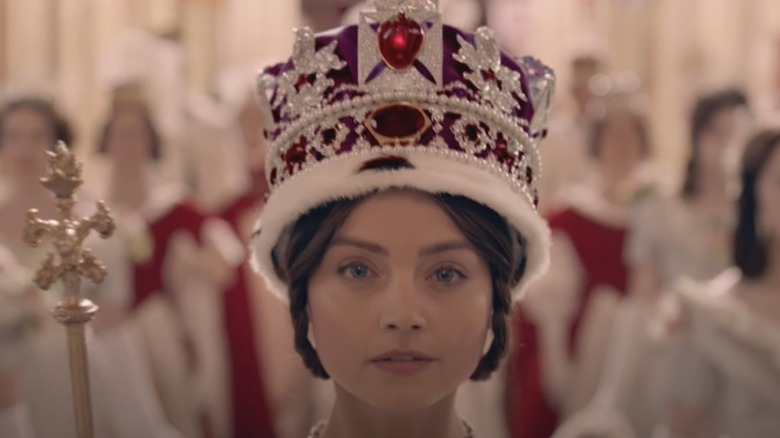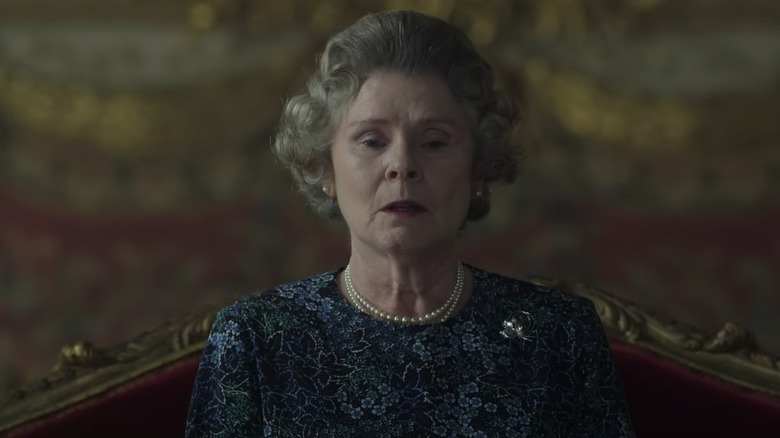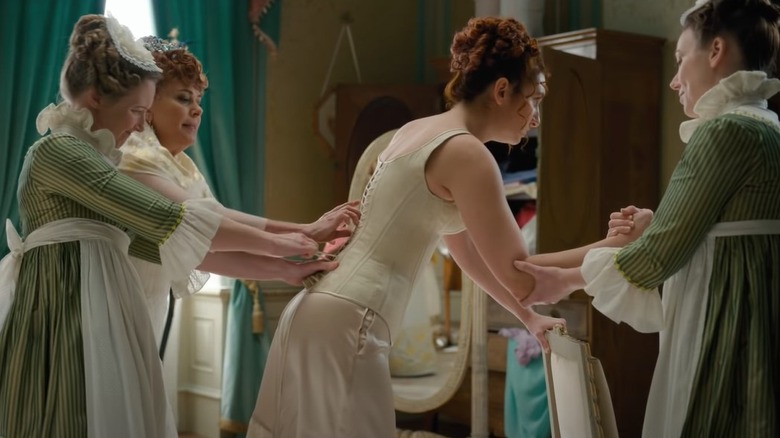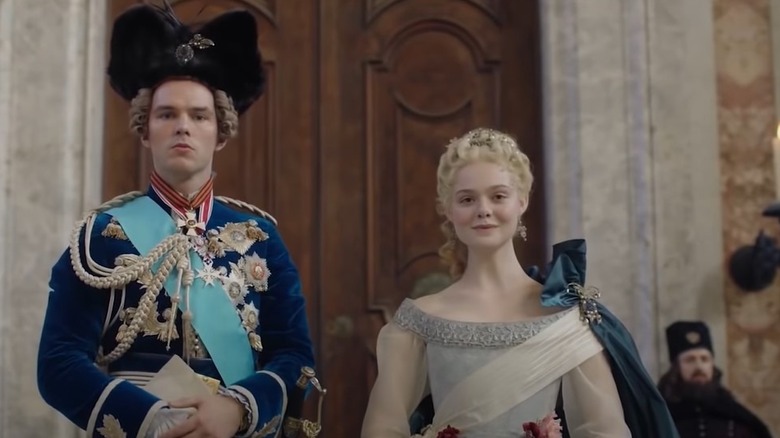The Best TV Shows To Watch If You Love The Royals
The royals are endlessly fascinating, with a long, strange history and life in the public. We want to know every detail about the royal family's lavish, prestigious, and dramatic lives. We hunger to know what they're wearing, the strange family traditions they must follow, and who doesn't like who and why. We go gaga over major royal events, whether we're watching them on TV or reading about them in the news. Many of us "attended" Prince William and Kate Middleton's wedding through our TV screens as if we were personally at the big event.
The popularization of television shows like "The Crown" is proof of our obsession. We love to watch royalty — whether we're watching them for real in 2022 as they mourn the queen's death, or reenactments of 1947 as Queen Elizabeth II weds Phillip or the Wars of the Roses in 1464. It's exciting to watch the obscenely wealthy navigate their power, attempt to connect with commoners, and perform political limbos to impress their court and get what they want. Sometimes we root for the royals other times we eagerly wait for their demise. From Henry VIII to Catherine the Great, and wealthy aristocrats like Thomas Cromwell, we love to dissect their political intentions and personal desires. If you are hungering to watch opulent fashion and political cattiness, here are some television shows that might satisfy your royal culture consumption craving.
The Tudors
The award-winning historical drama series, "The Tudors" is a four-season show that focuses on the rule of Henry VIII and spans the course of his six wives. ShowTime's 2007 television series was nominated for two Golden Globes, seven IFTA (Irish Film & Television) awards, and 15 Emmy nominations with six Emmy wins. The series begins with Henry's desire to divorce Catherine of Aragon for the young and beautiful Anne Boleyn.
The Toronto Star describes the show as a "Canadian/Irish/U.S. co-production" with "spectacular bouts of nudity and sex ... violence and its ribald language." The show stars Jonathan Rhys Meyers as Henry VIII, Natalie Dormer as Anne Boleyn, Henry Cavill as Charles Brandon, and Maria Doyle Kennedy as Catherine of Aragon. Show creator Michael Hirst told the British press that he used "The West Wing" and "The Sopranos" as inspiration for the show. While the show is salacious and filled with nudity, sex, and violence, Hirst claims that about 85% of it is historically accurate. The Toronto Star recounts Hirst's description of the show to the British press as "part history, part sexy soap," and when depicting certain parts of history, they sometimes go hand in hand.
The show's budget was $38 million, which covered filming in Ireland, large scenery, and beautiful period costumes. The scenery of the show mostly involves huge beds, fireplaces, scarce furniture, and large houses for a "sexy, modern Tudor look" as production designer Joan Bergin described. As of this writing, you can find "The Tudors" streaming on Showtime or Paramount+.
The Queen
History fans who are tired of fictionalized soap opera dramas and Queen Elizabeth II-obsessed may enjoy the 2009 British docu-drama series, "The Queen." This five-part series covers the queen's reign from 1955 to 2005. The series was created by Edmund Coulthard, Patrick Reams, and Colin Swash with the assistance of Penny Russell-Smith, the queen's former communications and press secretary who worked in Buckingham Palace for 14 years (The Guardian). While the series covers the "Annus Horribillis" (1992, the year Prince Charles and Princess Diana separated), it does not cover Diana's death.
In each part of the series, the queen is played by a different actress: Emilia Fox, Samantha Bond, Susan Jameson, Barbara Flynn, and Diana Quick. The docu-drama features a voice over that gives historical information about the events in the series, interspersed with acted-out scenes, real photos and footage, and interviews with real royal insiders. Currently, the show isn't on any official streaming service, but you can find it split up into parts on YouTube. If you're looking for something that takes history a bit more seriously than your average historical drama, this docu-drama may be right for you.
Downton Abbey
"Downton Abbey" is a popular British historical drama created by Julian Fellowes. The Emmy award-winning show originally premiered in 2010 and depicts the household of English aristocrats in the 20th century post-Edwardian period. It follows the aristocratic Crawley family (the upstairs) along with their servants (the downstairs). In total, there are 18 characters that we follow from 1912 to 1926 during the course of "Downton Abbey's" six seasons.
According to Slant Magazine, the series begins with news of the Titanic sinking and continues through World War I and the Spanish influenza, among other historical events. The central theme of "Downton Abbey" is, as Slant puts it, "the struggle between the comforts of stasis and the potential rewards of progress." From the women's rights movement, the blurring of class lines, and the invention of electricity, the world is rapidly changing. Some characters in the Crawley household welcome these changes more than others. As proof of this, Slant points out that half of the rooms in the house have electricity and half don't.
If you love all things royal, you'll love this series for its beautiful score, servant drama, and Gatsby-like costumes that pull the audience into the Edwardian culture of the 20th century (per Collider). The Guardian estimates that during its run 9.3 million people watched "Downton Abbey" every Sunday. A big draw to the show is the interconnections between the servants and masters, the lavish set, and a cast of passionate, talented actors.
Reign
The CW's "Reign" is a 2013 historical drama about Mary, Queen of Scots, played by Adelaide Kane. The show was canceled after four seasons. Its critics disliked the show for its soap opera plot being prioritized over historical accuracy which includes some mythical elements such as psychics and ghosts. The Hollywood Reporter calls the show "historical absurdism" — and not in a good way. However, the series is loved for its quick-paced modern drama.
The CW's "Reign" reimagines Mary's teenage years when she enters the French court as queen. The story opens with Mary being pulled out of the convent she grew up in since she was nine so she can marry the French Prince Francis (Toby Regbo). Throughout the series, Mary finds herself caught in a love triangle between Prince Francis and his fictional half-brother, Bash. Brian Lowry from Variety calls the series "Gossip Girl MDLVII." The Wrap compares Mary to Carrie Bradshaw in "The Carrie Diaries" as the show carries a universal theme of romance and coming of age. If you're looking for a lighthearted historical drama teen romance, then this show is just right for you.
The White Queen
"The White Queen" trilogy is based on Philippa Gregory's historical novel series and consists of three television mini-series: "The White Queen," "The White Princess," and "The Spanish Princess." It depicts the famous War of the Roses, a civil war between the Yorks and Lancasters, and the years that follow trying to keep the peace between the two families. The first miniseries, "The White Queen," was released in 2013. The series picks up after nine years of fighting between the Yorks and Lancasters. In "The White Queen," we follow Elizabeth Woodville, a commoner Lancaster with whom King Edward, from the opposing side of the war, falls in love (per Variety).
"The White Princess" aired in 2017 and follows the story of Elizabeth of York who is forced to marry Henry VII, whom she openly despises, to bring an end to the war.
The last mini-series in the trilogy is "The Spanish Princess," which aired in 2020. It centers around Catherine of Aragon, the daughter of Isabelle and Ferdinand of Spain, and her marriage to Henry VIII. According to The Princess Blog, "The Spanish Princess" is set 15 years after "The White Princess" and is the only series of the three to run for two seasons.
Wolf Hall
If you're looking for a dark historical drama about royalty that takes history seriously, then look no further than the BBC's "Wolf Hall." The 2015 series is an adaptation of Hilary Mantel's novel trilogy that serves as a fictionalized biography of Thomas Cromwell's life based on the author's five years of researching 16th-century political machinations in Henry VIII's court (The Guardian). "Wolf Hall" begins as a rags-to-riches story about a blacksmith's son becoming Henry VIII's chief advisor but it's primarily a story about navigating a political world that celebrates absolute rulers. The series begins with Cromwell (Mark Rylance) serving Henry VIII (Damien Lewis) and his first wife Catherine of Aragon (Joanne Whalley), and eventually tackles the beheading of Anne Boleyn (Claire Foy). Thomas Cromwell is a complex character who is calculated and observant. The New Yorker describes Cromwell as a character audiences root for not based on virtue, but because he has no illusions about himself.
"Wolf Hall" stands out from other 16th-century British dramas because it's serious and political (The Guardian), and Variety noted that "Wolf Hall" resists the temptation to glamorize King henry VIII and his court, unlike other depictions of the time period. According to On History, "Wolf Hall" consists of 120 characters, cost 7 million euros to make, and attracted about 26 million viewers during its run. The limited series was nominated for eight Emmy Awards, won a 2016 Peabody Award, and a 2016 Golden Globe for best miniseries or television film.
Versailles
There is no better time period, no better subject, and no better place for depicting the opulence and drama that comes with being royalty than Louis XIV's rule during the age of absolutism. "Versailles," the 2015 French-Canadian television show created by Simon Mirren and David Wolstencroft, depicts The Sun King, Louis XIV's (George Blagden) quest and vision to build Versailles. The Geographical Cure sites the series as having a budget of 24 million euros. It needed a large budget for the opulent scenery, costuming, and several expensive filming locations. Some wigs used in the series cost up to 4,000 euros.
The Guardian describes the show as mostly true, but with a lot of extra drama for extra fun. The show is no "Wolf Hall," but is guided by historical events and 17th-century culture. "Versailles" features rising tension between Catholics and Protestants, love affairs, and gossip. The series ends with the beginnings of the French Revolution. We watch Louis XIV navigate the tensions between the crown and its court as nobleman are plotting against him causing Louis XIV to put together a team to keep an eye out for disloyal noblemen. The series recounts Louis's relationship with his closeted homosexual brother Monsieur Philippe d'Orléans (Alexander Vlahos) and Louis's romantic relationship with Philippe's wife Henriette (Noémie Schmidt). "Versailles" is filled with sex, gossip, and opulence and while it can be describe as "trashy" television, sometimes shows like "Versailles" are the type of television the heart needs.
Victoria
"Victoria" is a 2016 British television series that stars Jenna Coleman as Queen Victoria. The show spans from Queen Victoria's early life, receiving the crown at the young age of 18 to balancing motherhood and wifely and queen duties as the third and final season depicts Victoria raising six children. According to The Hollywood Reporter, the creator of the show, Daisy Goodwin, took inspiration for the series from Victoria's "extensive" diaries. However, there were large chunks of the dairy ripped out, leaving Goodwin to fill in the blanks with her imagination. PBS features the series as part of its Masterpiece collection. "Victoria" came out around the same time as Netflix's "The Crown," and critics often compare the two. Comparisons have also been drawn between these two shows and ITV's "Downton Abbey," as all three series are historical dramas set in the 20th century, but Victoria's headstrong personality offers a new perspective.
The LA Times notes that the series focuses on themes of power, politics, gender, and romance. Queen Victoria struggles with the pressures of being a young queen with families who underestimate her and intend to undermine her power. We follow Victoria from her early life to her relationship with her husband Albert (Tom Hughes), and her political responsibilities from 1830 to 1850. Throughout the series, Queen Victoria can be impetuous, stubborn, and rebellious. The Hollywood Reporter describes Queen Victoria's tendency to dismiss traditions and expectation and to just be her unapologetic self, making her a likable protagonist and making the show a fun watch.
The Crown
The Emmy Award-winning Netflix original show "The Crown" is a fictionalized story inspired by real political and cultural events that shaped Queen Elizabeth II's reign. Every two seasons, Queen Elizabeth is played by a different actress as she ages throughout the show. Season 1 begins with Claire Foy playing Queen Elizabeth in 1947, and Season 2 picks up in 1956, taking us into the '60s. For the third and fourth seasons, Olivia Colman plays Queen Elizabeth and takes the show into the '90s. In the upcoming fifth and sixth seasons, Imelda Staunton, who you may recognize as the "Harry Potter" series' Professor Umbridge, will be taking over as Queen Elizabeth. On October 20, 2022, the trailer for "The Crown's" fifth season dropped on YouTube. According to Glamour, the fifth season will be dropped on Netflix on November 9. Peter Morgan, the creator of the show, recently announced that he plans for six seasons of the show. This was the original plan, but there were rumors that he was debating scaling back the show to five seasons.
"The Crown" invites you into the intimate moments of the royal family from weddings to cheating husbands and political dissonance "The Crown" is a must watch. Variety highlights the beautiful sets, shiny jewelry, epic costumes, and royal rituals and traditions, but notes that the best part of "The Crown" is how it depicts the queen coming into her own and embracing her place in the royal family. If you love royal gossip and you love Queen Elizabeth, "The Crown" is not a show you can afford to miss.
Bridgerton
"Bridgerton" is not for viewers looking for the strictly historically accurate. This Netflix historical drama is less about the history and more about romance. The gossip, opulence, and funny names like Lady Whistledown will draw you right in and keep you entertained. "Bridgerton" is based on Julia Quinn's novels and follows the eight siblings of the Bridgerton family: Benedict (Luke Thompson), Anthony (Jonathan Bailey), Hyacinth (Florence Hunt), Eloise (Claudia Jessie), Gregory (Will Tilston), Colin (Kuke Newton), Francesca (Ruby Stokes), and Daphne (Phoebe Harriet Dynevor) as they search for marriage and romance in Regency England. In "Gossip Girl" fashion, there is a columnist who goes by the name Lady Whistledown who publishes salacious gossip about the scandalous lives of British aristocrats.
Marie Claire notes that viewers adore the amazing cast and over-the-top makeup, hair, and costumes. "Bridgerton" is also Netflix's most-watched English-language show, with over 251 million viewers. The show has already been renewed for two more seasons. The book series spends each novel on one of the sibling's love life and the TV show is planning on doing the same. Executive producer Shonda Rhimes admitted to Entertainment Tonight that "[the show's] not necessarily going in order but we are going to be seeing each of the siblings and their stories." You'll have to tune in to the third season to find whose love life the series focuses on next.
The Great
"The Great" is a 2020 Hulu original series that is "an occasionally true story" about Catherine the Great, empress of Russia. The 2020 satirical black comedy-drama chronicles Catherine (Elle Fanning), the German princess-turned-Russian empress and her takeover of the Russian Crown from her husband Peter III (Nicholas Hoult). The show is fast-paced, sexual, brutal, and sometimes bizarre as Catherine spends the first season plotting her husband's death. "The Great" offers a refreshing perspective that dares to be hedonistic, rude, gross, silly, and still maintain its wit (The Guardian).
Peter III is portrayed as a childish, privileged monster who, instead of crying when he doesn't get what he wants, resorts to violence and threats. On the other hand, Catherine is an overly optimistic, sometimes naive progressive who believes she can lead Russia to a brighter future. The show is full of cursing, scheming, sex, big dresses, lavish balls, romance, and more. Stepping into the second season, Catherine continues to understand Russian customs, keep Peter in check, and pursue her political agenda. Not to mention the love-hate "chemistry between Fanning and Hoult is arguably the best on television," according to Roger Ebert reviewer Brian Tallerico. "The Great" has been renewed for a third season, though the release date is unknown. While we don't know what the third season will hold, we're certain it will be just as ridiculous, dramatic, and endlessly entertaining as the seasons before it.
